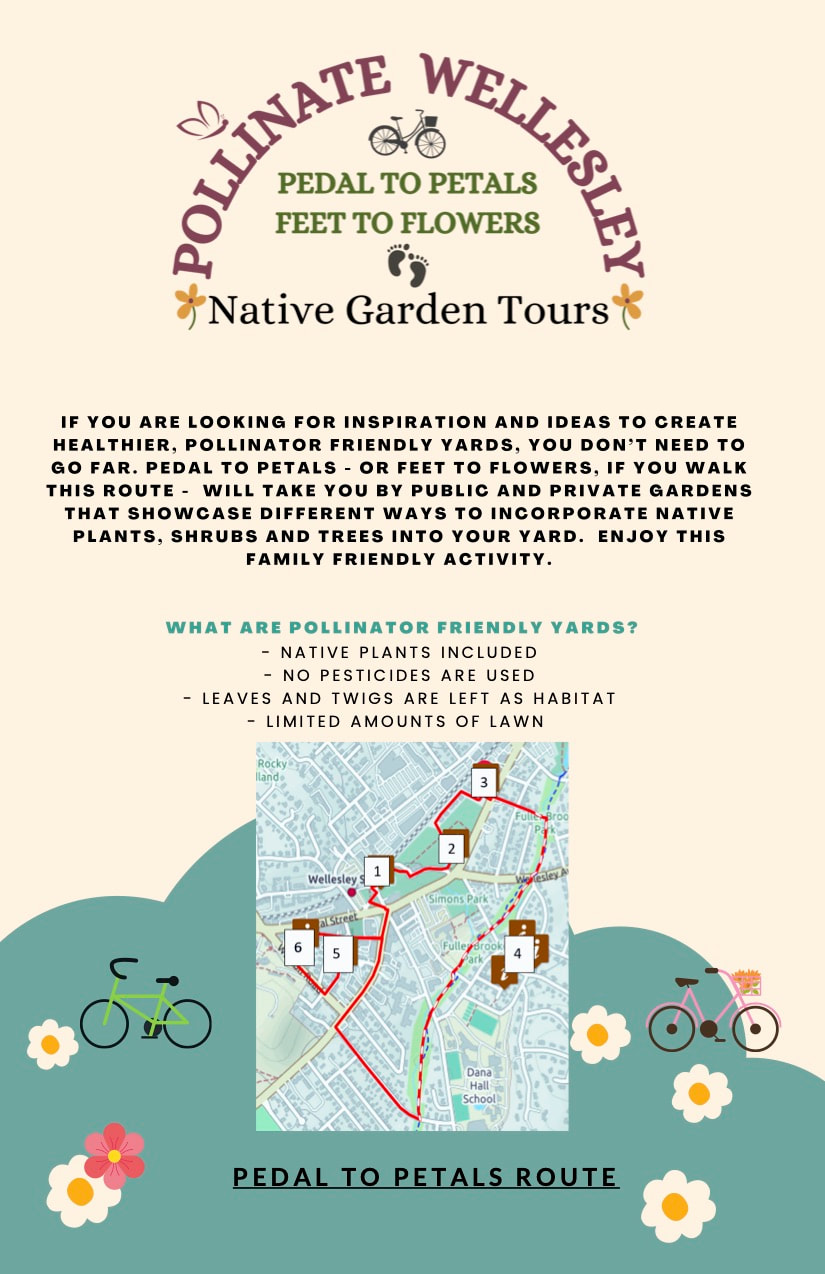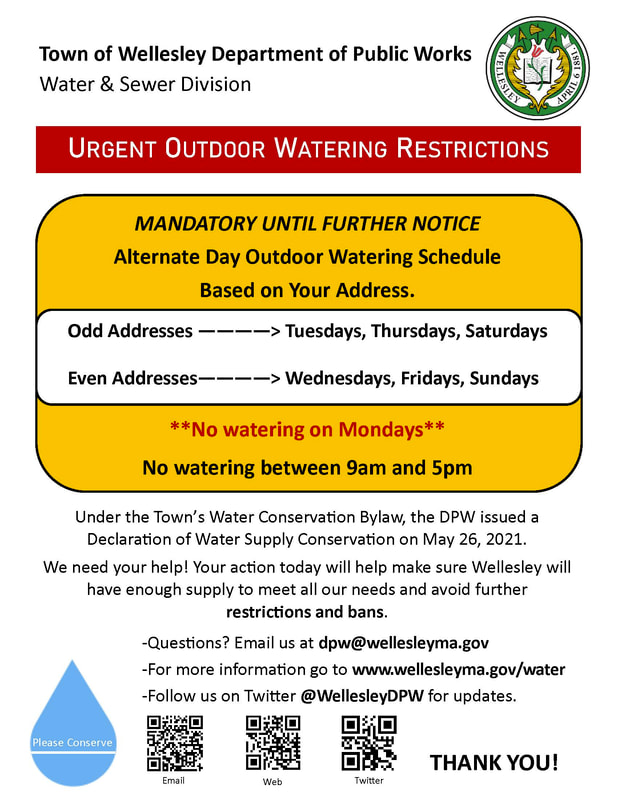|
From the Town of Wellesley:
Mandatory outdoor watering restrictions are in effect for all Wellesley citizens and business owners for Summer 2024. The requirements include alternate day outdoor watering schedules for homes and businesses, a ban on outdoor watering between 9 a.m. and 5 p.m., and a request to reduce the amount of outdoor watering time by 20 percent. These efforts are needed to ensure that Wellesley’s water supply is sufficient to protect the health and safety of residents, including providing enough water necessary to fight fires. This is a preventative measure to ensure adequate water supply throughout Town while the PFAS filter media is being replaced at the Morses Pond Groundwater Treatment Plant. Typically, this treatment plant supplies over 750,000 gallons of water per day to homes and businesses. We anticipate that the plant will be down between 1 to 3 weeks. If our region experiences drought conditions in the coming months, additional restrictions may be required. Outdoor Water Use Alternate Day RestrictionsBased upon street address numbers, essential and nonessential outdoor water use IS ALLOWED according to the following schedule:
Essential uses of water are:
To help maintain appropriate water levels in Town storage tanks, the DPW is also asking residents to reduce the amount outdoor watering time by 20%. For example, if you have an automated irrigation system with a 15-minute watering time in each zone, you should reduce each zone’s watering duration by at least 3 minutes. Additional water conservation recommendations include checking for and repairing any water leaks in irrigation systems, faucets, showerheads, and toilets. A good first step when considering how to make changes that are good for you and good for the planet is to get to know the plants, insects and wildlife in outdoor areas around you. Take a break during work hours at home to walk around. Look and listen. As you add native plants and move away from chemical fertilizers and use of gas-powered equipment, there will be more to look at.
A good rule of thumb – "let it be":
Scan the QR code or visit this link to join Team Wellesley and pledge to stop using quick-release fertilizers and pesticides on your lawn. This grass roots effort will help the Town combat climate change, restore habitat, restore local clean water cycles, empower your lawn to capture more carbon and become a better sponge of excess storm water during extreme weather events.
The Wellesley Department of Public Works (DPW) needs your help to reduce the current demand for water in Wellesley and has issued a State of Water Supply Conservation Declaration. The decision requires residents and businesses to begin following specific water restrictions effective Monday, May 23, 2022. The requirements include a mandatory alternate day outdoor watering schedule for homes and businesses, a ban on outdoor watering between 9 a.m. and 5 p.m., and a request to reduce the amount of outdoor watering time by 20 percent. Complete details are included below.
According to DPW officials, the measures are needed to ensure that Wellesley’s water supply continues to protect the health and safety of residents, including providing enough water necessary to fight fires. Due to drier than normal conditions this spring, on May 11, the Massachusetts Executive Office of Energy and Environmental Affairs (EEA), declared a Level 1 – Mild Drought status for the Southeast Region. Additionally, water supplies in Town are lower than normal because the Morses Pond water treatment plant was taken offline in May 2021 after tests showed higher than allowed levels of PFAS6 substances. This treatment plant supplies over one million gallons of water per day to homes and businesses and its loss is causing a shortage in the system. While the Morses Pond treatment plant is scheduled to come back on line this June, these restrictions are necessary to ensure adequate supply for essential water use. “We’re asking for cooperation from everyone in the community by following these restrictions as we head into the summer months,” said DPW Director Dave Cohen. Outdoor Water Use Alternate Day Restrictions Based upon street address numbers, nonessential outdoor water use IS ALLOWED according to the following schedule: • Odd numbered addresses are restricted to Tuesday, Thursday, and Saturday. • Even numbered addresses are restricted to Wednesday, Friday, and Sunday. • Nonessential outdoor use of water on Monday is prohibited. Nonessential outdoor watering hours are restricted to before 9:00 a.m. and after 5:00 p.m. Outdoor watering is prohibited during the daytime to ensure adequate water supply for typical essential uses and to avoid loss through evaporation. Essential uses of water are: • For health and safety reasons • Irrigation to establish a new lawn and new plantings between the months of May and September • Agricultural operations to maintain livestock and crops • Irrigation of lawns, gardens, flowers and ornamental plants by means of a hand-held hose Nonessential uses are: • Irrigation of lawns via sprinklers or automatic irrigation systems • Washing of vehicles, except in a commercial car wash or as necessary for operator safety • Washing of exterior building surfaces, parking lots, driveways or sidewalks, except as necessary to apply surface treatments such as paint, preservatives, stucco, pavement, or concrete Reduce Use While Watering To help maintain appropriate water levels in Town storage tanks, the DPW is also asking residents to reduce the amount outdoor watering time by 20%. For example, if you have an automated irrigation system with a 15-minute watering time in each zone, you should reduce each zone’s watering duration by at least 3 minutes. Additional recommendations to help reduce water use include checking for and repairing any water leaks in irrigation systems, faucets, showerheads, and toilets. Visit the DPW webpages for more information on water conservation. The Natural Resources Commission also offers tips for healthy and sustainable lawn and landscape care. Impact of PFAS6 on Water Restrictions The DPW’s Water Division acknowledges that the current PFAS6 situation is a major reason for these new rules. PFAS6 is a new drinking water standard which tests for the sum of six PFAS compounds. PFAS are Perand PolyFluorAlkyl Substances, a group of numerous human-made chemicals used since the 1950s to manufacture stain-resistant, water-resistant, and non-stick products. This drinking water standard is set to protect against adverse health effects for all people consuming the water. “It’s important to note that the Morses Pond plant was the only one in Wellesley with higher than allowed PFAS6 levels. We have been working to implement a temporary remediation system at the Morses Pond plant and look forward to becoming operational in the coming weeks” said Water and Sewer Superintendent Bill Shaughnessy. “Since May 3, 2021, all water for Wellesley is coming from the Town’s two other treatment plants and from the Quabbin and Wachusett reservoirs operated by the Massachusetts Water Resources Authority (MWRA). All of the water provided to our residents meets all current MassDEP water quality standards.” Residents with individual concerns about PFAS should contact their physicians or other health professionals. For complete PFAS information, visit the DPW and MassDEP webpages. The Wellesley Department of Public Works (DPW) is helping cut carbon emissions with a significant investment in electric landscaping equipment. Starting this week, residents will see this new equipment in use in parks and open spaces and the entire Town will reap the benefits of these positive climate actions.
The department recently expanded its rechargeable battery-powered fleet, using funds from its Fiscal Year 2022 budget to purchase a large EGO riding mower and EGO brand cordless outdoor equipment including: two electric push lawn mowers, a pole hedge kit, six carbon fiber trimmers, and 4 leaf blowers. These new tools are in addition to other small rechargeable equipment like trimmers and leaf blowers that DPW bought in 2020. All are the same make and batteries for the equipment are interchangeable. The purchases were spurred by panel discussions a year ago sponsored by the Town of Wellesley, Lexington DPW, Wellesley Natural Resources Commission, and Sustainable Wellesley in partnership with two nonprofits, American Green Zone Alliance and Quiet Communities, Inc. Look for DPW crews using the new equipment at four established green spaces: Central Park near the Wellesley Square post office, Church Park in front of the Village Church, the Wellesley Police Department grounds, and the Tolles Parsons Center on Washington Street. These high-traffic parklands showcase pesticide-free landscaping and low-maintenance native plantings to foster birds, bees and other useful insects. Because they run on rechargeable batteries, this equipment eliminates fumes and vibrations that are harmful to operators and passersby, and have lower decibel levels to reduce use noise. To keep equipment charged when away from power sources, DPW Director Dave Cohen is mounting charging stations on a trailer. “We are eager to see how this set up works and if the equipment can give crew members the sustained service that is required during long work days,” said Cohen. According to Paul DePhillips, Assistant Superintendent of the DPW Park & Tree division, the team is also considering adding a solar panel to the roof of the trailer to provide some additional charging capability and reduce or even eliminate plug-in charging time. DePhillips’s crew has also added four electric chainsaws. The most expensive piece is the rider electric mower, which retails for about $4,999 and can cut up to two acres on a single battery charge. The motor emits a sound that resembles a ‘faint whine,’ instead of a louder mowing noise. In the coming months, DPW will be collecting data to quantify the benefits of shifting to electric equipment and will present this information to the Town to help inform future decisions about expanding the electric landscaping program. Climate Action in Wellesley The electric landscaping equipment program is helping support the Town’s climate action goals to reduce greenhouse gas (GHG) emissions 50% below 2007 levels by 2030 and reach net-zero by 2050. Wellesley is currently developing a Climate Action Plan that will serve as a roadmap for reaching these goals. To learn more visit https://www.wellesleyma.gov/1584/Climate-Action- Plan. Looking for a fun and family-friendly outdoor activity? Take a leisurely bike ride or walk along a 2.8-mile garden tour around Wellesley that highlights pollinator gardens in Town. The self-guided tour will take you past gardens at the Wellesley Post Office, Town Hall, the Police Station, the WHS garden and some private gardens, as well - all of which are pesticide free. Click here to learn more.
Pollinate Wellesley is a joint initiative of Sustainable Wellesley, Wellesley Conservation Land Trust, and the NRC. When we protect our pollinators we protect ourselves! Small gas engines are a leading source of air pollution. Find out why battery powered maintenance equipment is the superior solution.
Join a webinar on electric outdoor power tools on June 23, 3pm-4pm. Experts in the in outdoor maintenance industry will be on hand to discuss the environmental advantages of transitioning away from gas-powered tools.! Coalition for an informative webinar on electric outdoor power tools. We'll be talking with some of the leading experts and advocates for the electrification of the landscape maintenance industry and the manufacturers of outdoor landscape equipment about why this is important, the state of the transition away from gas powered tools, and provide tips on how you can make this transition in your home or community. They will cover:
Panelists Dan Mabe grew up in the outdoor maintenance industry and founded American Green Zone Alliance to improve the quality of life for communities and working conditions for landscape operators. He has become the nations leading expert on electrification in this industry by providing education, training and tool choice validation for low noise, low impact operations. AGZA has pioneered the concept of Certified Green Zones - properties on which routine grounds maintenance is performed with low-impact equipment and practices. AGZA has worked with communities, schools and corporations to certify Green Zone outdoor spaces and document the beneficial impacts in 7 states across the US. Jason Jones, National Business Development Manager for EGO Power tools, and Jack Easterly, Brand Manager for Husqvarna will provide insights on the latest technology and industry trends from two of the leading manufacturers in the industry. Donations: Please consider donating a couple of dollars for this webinar to the Electrify Everyone Fund. All proceeds from your donations go towards installing free heat pump water heaters in low income homes through the nonprofit Community Energy Project. Your donation will help reduce carbon emissions and lower utility bills for these families. Thank you! The Electrify! Coalition: Our coalition of non-profits, faith based groups, HVAC contractors, youth groups, builders and energy providers is dedicated to accelerate electrification through education and policy. REGISTER HERE |
Categories
All
|
Sign up for updates! |
Contact |
Support us! |
Follow us!Copyright © 2024 By Sustainable Wellesley
|









 RSS Feed
RSS Feed